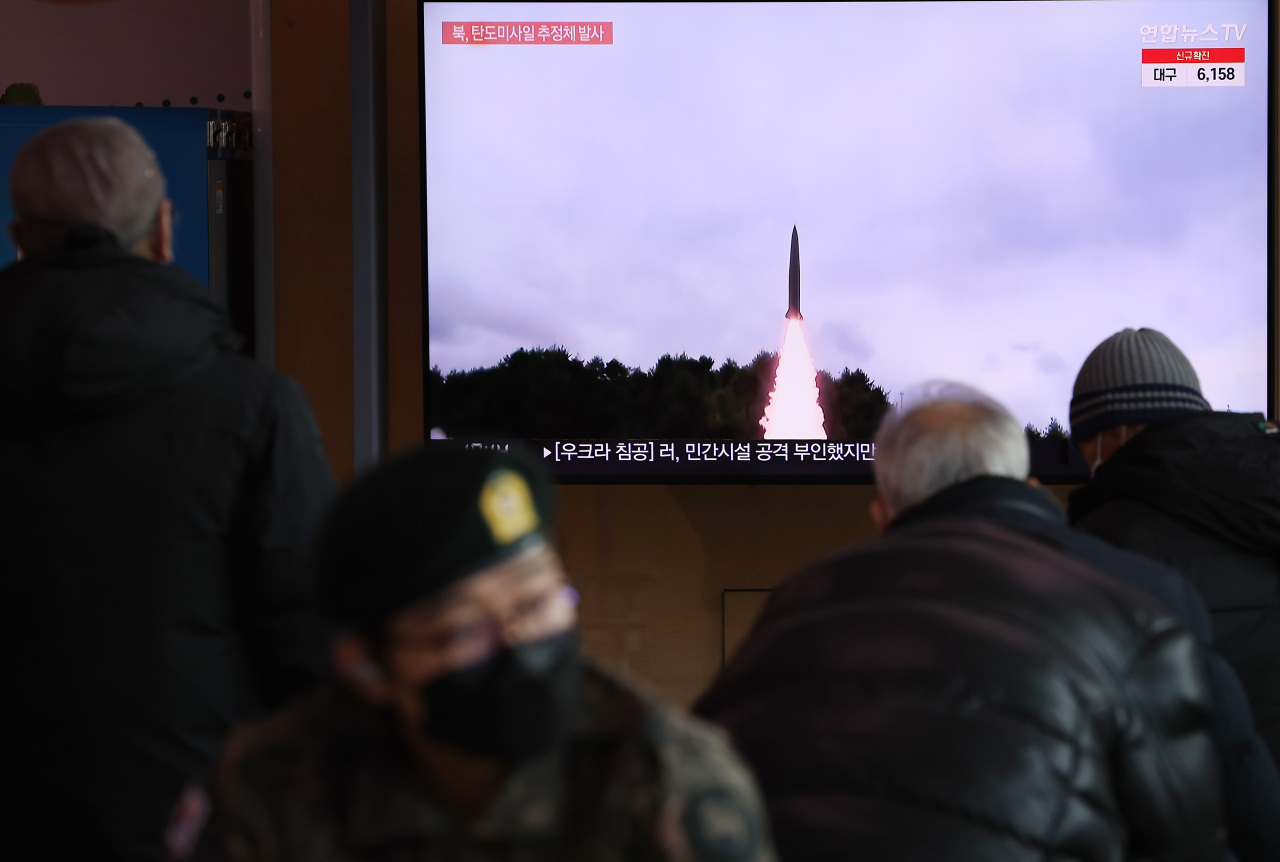NK says it conducted test for reconnaissance satellite
By Ahn Sung-miPublished : March 6, 2022 - 15:30

North Korea has conducted “another important test” for a reconnaissance satellite, its state media said Sunday, a day after South Korea’s military described the test as a probable ballistic missile launch.
The North’s National Aerospace Development Administration and the Academy of Defense Science conducted “another important test on Saturday under the plan of developing a reconnaissance satellite,” the official Korea Central News Agency reported.
“Through the test, the NADA confirmed the reliability of data transmission and reception system of the satellite, its control command system and various ground-based control systems,” it said.
Saturday’s test, which came just days before South Korea’s presidential election Wednesday, was the second such launch in a week to test satellite equipment, and the ninth missile launch this year. The test-firing immediately drew condemnation from the US, South Korea and Japan, as observers suspect the North’s satellite launches as a cover for testing long-range ballistic missile technology banned by United Nations Security Council resolutions.
The North’s state media did not elaborate further, nor mention any missile or rocket launches to test such satellite technology.
South Korea’s Joint Chiefs of Staff on Saturday said the missile, launched at 8:48 a.m. from Sunan, near Pyongyang, flew about 270 kilometers to the east, reaching an altitude of 560 kilometers. The range and other details appeared to be similar to the regime’s Feb. 27 test, which Pyongyang said was for a “reconnaissance satellite,” while neighboring countries countered that it was a ballistic missile launch.
Experts say the North may be preparing a spy satellite launch in time for a key political anniversary on April 15, the 110th birthday of state founder Kim Il-sung, the late grandfather of leader Kim Jong-un.
“Considering the North’s testing for the development of spy satellites at intervals of six days, it appears the North is aiming to launch a spy satellite before Kim Il-sung’s 110th birth anniversary,” said Cheong Seong-chang, director of the Center for North Korean Studies at Sejong Institute. “While the North may succeed in launching a reconnaissance satellite, it would take a very long time for the North to secure militarily meaningful reconnaissance technology as strict international sanctions have restricted its import of high-tech equipment and the North’s civilian technology that is lagging.”
At the congress of the ruling Workers’ Party of Korea in January last year, its leader Kim revealed a long list of new weapons systems the regime is developing, including reconnaissance satellites. Developing such technology is largely seen as the North’s attempt to fire an intercontinental ballistic missile. This is because delivering the satellite into orbit requires a long-range rocket launch, which uses similar technology to ICBMs.
Amid the stalled denuclearization talks between North Korea and the US, Pyongyang in January threatened ending its self-imposed, four-year moratorium on testing nuclear weapons and long-range ballistic missiles in order to bolster defense against the “hostile policy and military threats by the US.”
Since the start of this year, the regime has launched a barrage of missiles, including an intermediate-range ballistic missile and a purported hypersonic missile, with some saying Pyongyang is seeking to get Washington’s attention as it remained fixated on Russia’s invasion of Ukraine.
“The Kim regime may be unhappy with Washington coordinating global efforts against Russian aggression in Ukraine and disappointed with Seoul’s inward focus ahead of the South Korean presidential election,” said Leif-Eric Easley, a professor of international studies at Ewha Womans University. “But North Korea does not simply test missiles for international attention. Pyongyang’s current priorities are military modernization and domestic politics.”


















![[KH Explains] Hyundai's full hybrid edge to pay off amid slow transition to pure EVs](http://res.heraldm.com/phpwas/restmb_idxmake.php?idx=652&simg=/content/image/2024/04/18/20240418050645_0.jpg&u=20240419100350)

![[Today’s K-pop] Zico drops snippet of collaboration with Jennie](http://res.heraldm.com/phpwas/restmb_idxmake.php?idx=642&simg=/content/image/2024/04/18/20240418050702_0.jpg&u=)